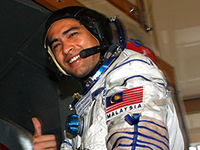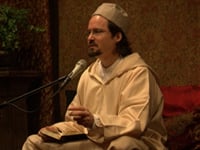 Because there are Muslims all over the world, fasting has occurred in many different places, climates, and circumstances. But what happens when the boundaries are pushed? For example, in October a Muslim astronaut will be grappling with the prospect of fasting while in orbit aboard the International Space Station (ISS). Obviously, this brings up many questions: Does hurtling through space at thousands of miles an hour trigger the travel exemption? If not, at what time does the fast begin and end? If you went by sunrises and sunsets while on the ISS, you could have 16 mini-fasts in an Earth day, which wouldn’t be much of a spiritual exercise. (The Muslim astronaut, Sheikh Muszaphar Shukor, will fast according to his home time zone in Malaysia.)
Because there are Muslims all over the world, fasting has occurred in many different places, climates, and circumstances. But what happens when the boundaries are pushed? For example, in October a Muslim astronaut will be grappling with the prospect of fasting while in orbit aboard the International Space Station (ISS). Obviously, this brings up many questions: Does hurtling through space at thousands of miles an hour trigger the travel exemption? If not, at what time does the fast begin and end? If you went by sunrises and sunsets while on the ISS, you could have 16 mini-fasts in an Earth day, which wouldn’t be much of a spiritual exercise. (The Muslim astronaut, Sheikh Muszaphar Shukor, will fast according to his home time zone in Malaysia.)
The prospect of Muslims in space gets more complicated when you consider settlement on the moon and other planets. A Martian day is only slightly longer than ours (37 minutes), but a day on Venus is 243 Earth days. And how do you spot the Ramadan moon when you’re standing on top of it? When you pray on another planet, which way do you face? (One suggested answer: create a “new Mecca” on that planet — similar to the one in the sci-fi movie Pitch Black — and pray towards that.)
We’ve faced theological questions regarding Ramadan down here on Earth as well. Think about what fasting means for Muslims living above the Arctic Circle. During summer, the sun never really sets, and during winter it never breaks the horizon. What’s a fasting Muslim to do? (In many cases, many Muslims use the sunrise/sunset times of the nearest major metropolitan area south of the circle.) Similar problems occur when people travel long distances across time zones. Assuming you do not take the traveling exemption, do you end your fast a few hours early/late at the destination, or go by the place where you started your fast? (Answer: it’s pretty much up to you.)
The important thing to note about all these cases is that when faced with unique situations not forseen 1,400 years ago, scholars have come up with reasonable accomodations. Many people have a conception of Islamic law as being strict and immutable. That may be the way certain Muslims look at it, but in most cases there can be considerable leeway to adjust laws based on the reality in which we live. This corresponds with the Qur’anic reassurance that no soul shall have a burden laid on it greater than it can bear.

